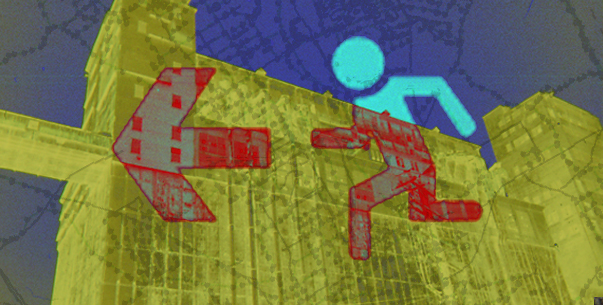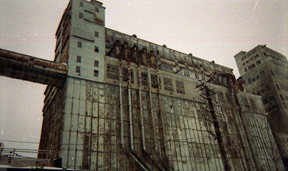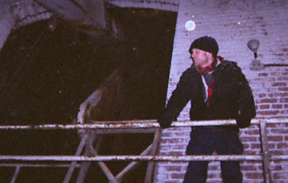|
|
Urban Exploration
the yoga of going where you're not supposed to, the zen of infiltration…
by Ian Sullivan Cant

photos by Ian Sullivan Cant
“Urban Exploration is free, fun and hurts no one. It's a thrilling, mind-expanding hobby that encourages our natural instincts to explore and play in our own environment. It encourages people to create their own adventures, like when they were kids, instead of buying the pre-packaged kind. And it nurtures a sense of wonder in the everyday spaces we inhabit or pass by that few local history books could ever hope to recreate. -Ninjalicious
My friend and I dug aside the fresh snow at a place along the bottom of the chain-link fence. He pulled the fence up as I slid underneath on my back, and he followed. We were in the glow of nighttime city lights, under a steady fall of snow, and towering above us, the massive grain elevator that we’d be exploring stood by the Old Port. The silo was built in 1921 and abandoned in the 1980’s, and it dwarfs any other buildings that this city has to offer. It’s laid out on the waterfront like a behemoth, made up of tunnels and towers, veined with pipes, and painted with corrosion. Every inch of it is wearing away in some weird and wonderful way. To my eyes the dilapidated silo was one of the most beautiful structures I have ever seen.
 Urban Exploration is a term that was coined by a man who wrote under the penname, Ninjalicious. It means exploring the urban environment, specifically, exploring the off-limits areas in our public spaces. There is a winding labyrinth of storm drains and utility tunnels under the streets of any city. Derelict buildings lay out like fossils filled with stories open to anyone who looks, and any hospital, shopping mall, office, hotel, church, or transit system, is filled with history and secrets. There is a whole world that lays hidden right in front of us, like the shadow of our everyday city lives. Urban Exploration is a term that was coined by a man who wrote under the penname, Ninjalicious. It means exploring the urban environment, specifically, exploring the off-limits areas in our public spaces. There is a winding labyrinth of storm drains and utility tunnels under the streets of any city. Derelict buildings lay out like fossils filled with stories open to anyone who looks, and any hospital, shopping mall, office, hotel, church, or transit system, is filled with history and secrets. There is a whole world that lays hidden right in front of us, like the shadow of our everyday city lives.
When we slid under that chain-link fence it was right next to a very large sign that read, “no trespassing”. Urban Exploration means doing things that are illegal and illegal things are therefore bad. Right? It is bad to do what you are told not to do. Right? My friend and I were willingly breaking the law by standing in the snow on one side of a fence and not the other, and it felt like this:
A rule, a law, a preconception, a prejudice, or an idea, is no more impenetrable than a chain-link fence, that is, impenetrable only if you believe it to be. If you hop a fence you must deeply consider the significance of your actions. In Urban Exploration you learn the difference between merely doing as you’re told, and being responsible for yourself and your actions. There is no one overseeing you, no one protecting you, no person telling you what to do, where to go, or who to be. In Urban Exploration you choose to not simply obey, but rather be responsible for yourself and your actions.
Sounds like some of the stuff I hear from my Zen teacher.
We darted around the building, over to the waterside as we approached our point of entry into the silo. Broken ice floated in the harbour, quietly clattering on the water. A brand new barbed wire fence surrounded what was to be our entrance. We could see that even if we got in the doors were all bolted shut.
In Urban Exploration you learn the difference between merely doing as you’re told, and being responsible for yourself and your actions … you choose to not simply obey, but rather be responsible for yourself and your actions.
Disappointed, we strolled around the lot. Although we couldn’t get inside, the structure was awe-inspiring from without. We took a few photos of each other. I climbed up a steel ladder onto some kind of loading platform. As my friend snapped a photo from the ground I saw a fox dart across the lot in the distance, through the fresh snow.
I grew up as a city kid who went to boy scouts, and hiked in the mountains, but I’ve been in University for the past four years, so with no free time I’ve been stuck in the city for far too long. The stillness and the solitude of the silo late at night reminded me of being out in the wild. It made no difference that this was a building and not a mountain, but I felt like a part of a greater place, not really owned by human beings anymore. Someone may hold title to this property, and some guard may circle it in a minivan once a night, but as the silo corroded away, and as the foxes made it a home, it would slip through our finger and take on a life of its own. Like a sunken ship that becomes a coral reef, the silo had a second life that towered against the skyline of the city’s port, but was hidden from view.
Care has to be taken in Urban Exploration. You can ruin an incredible site for everyone else that may wish to explore it by not respecting the space and leaving it as you found it, More significantly, when you begin to discover the wonders that can be found in the hidden world you learn to see the sites you explore with respect, to feel responsibility for the places. In the day-to-day of my city life I can often feel that I’m guarded against the outside world like a fortress. Usually I feel like everyone else could just go to hell for all I care, because it takes everything I’ve got just looking out for myself, but when I explore a site like the silo, even as I may be prowling around on the lookout for guards, the front line in the battle between myself and everything else dissolves.
Sounds like the stuff my Zen teacher talks about.
 Urban Exploration is far more fun than Zen, and although I’m pretty sure it’s not a path to enlightenment, it adds richness to my life, and a sense of openness that, when my giant mess of fear and anger goes away, even serves as inspiration to return to my Zen practice. Urban Exploration is far more fun than Zen, and although I’m pretty sure it’s not a path to enlightenment, it adds richness to my life, and a sense of openness that, when my giant mess of fear and anger goes away, even serves as inspiration to return to my Zen practice.
The snow kept falling steadily on the silo, and one of the lights flickered in and out above us. We were confident that the guard was not coming around, and we walked about casually, pointing out places where steel plates sealed holes in the building, doors that were welded shut, and gaping with amazement at the building from every angle. I’ve since learned that the silo is much maligned by most of the city’s residents. It’s considered an eyesore by most, but I doubt that any of those people have ever seen it as closely as we saw it. We were not going to get inside tonight, but we found what we had come for.
Ian Cant is a poet and fiction writer from Newfoundland, who is currently hitchhiking across Eastern Canada.
|